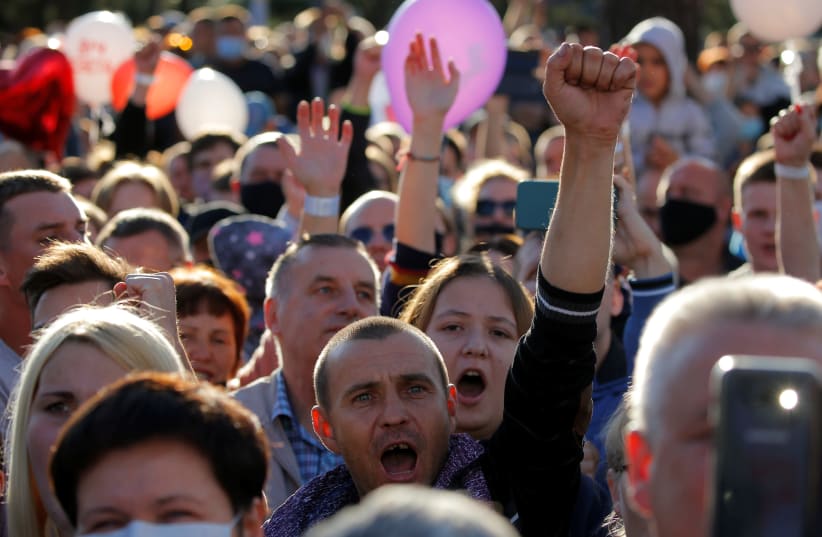Thousands of people took to the streets in Belarus last week as the republic's Central Electoral Committee disqualified the only non-jailed oppositioner of President Alexander Lukashenko, Deutsche Welle and Belarusian non-state media reported.
The crowds were met with riot police and air raid sirens used to disperse the demonstrators. At least 420 protesters and journalists have been arrested by the Belarusian authorities following the demonstrations, according to civil-rights watchdog Viasna (Spring) quoted by Belarusian media site Tut.by.
Беларусь Прогнали ОМОН и тихарей pic.twitter.com/qH6sdHYvaj
— КОРОНАВИРУС ☢️Украина (@Virus19Korona) May 31, 2020
Three main candidates registered ahead of the August 9 presidential election as Lukashenko's opponents, two of which – anti-establishment blogger Siarhei Tsikhanousky and banker Viktar Babaryka – are currently in prison.
The third candidate, Valery Tsepkalo, was disqualified two weeks ago, fleeing the country with his children earlier this week following threats, according to The New York Times.
Following the disqualification of the other candidates, Sviatlana Tsichanouskaya, the wife of jailed blogger Tsichanouski, registered as a candidate for the opposition, merging her campaign with those led by the wives of the other candidates.
With state polls commonly giving Lukashenko 85% of the votes, the president currently enjoys an official approval rating of 24%. Independent polls, however, suggest Lukasheko's approval rating stands at 3%, with social media users nicknaming the leader "Sasha 3%," Radio Liberty / Radio Free Europe reported.
According to a poll conducted by Radio Liberty, Tsichanouskaya's support among Belarusians stands at 49%, with an additional 32% going to jailed Babaryka and 7% to exiled Tsepkalo, giving the opposition's only candidate up to 88% of support.
Since the beginning of Tsichanouskaya's campaign, thousands of citizens participated in support rallies and protests across the republic, with Lukashenko warning of a Belarusian "Maidan," referencing the 2014 violent removal of Ukraine's pro-Russian president Viktor Yanukovich.
В Новополоцке сейчас такая атиосфера #тихановская #беларусь pic.twitter.com/F9ydPvJ14u
— Алексей Кириленко (@Kirilenko_a) July 24, 2020
"Nowadays, wars start from street protests and demonstrations," Lukashenko said in a Friday speech to the Belarusian Defense Forces, according to BelTA. "I do not think there are that many bases that I visit that often. You are a special detachment of our Defense Forces."
That very detachment, "according to its specialization, is exactly the one meant to be used to restore public order in case of a Maidan, God forbid."
Known as the Last Dictatorship in Europe, Belarus has been governed by Lukashenko for the last 26 years, ever since he first assumed office in 1994.
Following two referendums in 1995 and 1996, during which Lukashenko's presidential authority was dramatically expanded, elections were adjourned and Soviet symbols were restored, and the politician became the authoritarian ruler of the republic.
Pro-Russian reforms, including the change of the official language in Belarus and its tense integration with neighboring Russia, also followed the polls.
The referendums took place after two intensive campaigns in state-controlled media, coming under heavy international criticism and facing claims of misconduct and falsification of both voter turnout and the votes themselves.
Following the reforms, the Belarusian democratic opposition raised a vote of no confidence against Lukashenko, with former ministers and prominent opposition leaders going missing days before the vote, according to Belsat TV.
Once a minister under Lukashenko, prominent oppositioner and alternative presidential candidate Yury Zakharanka was reportedly abducted on his way home on May 17.
In an interview with Belsat TV, political refugee and former Special Rapid Response Unit (SOBR) soldier Yuri Garavski claimed Zakharanka was grabbed by the unit and shot twice by its commander, Dzmitry Paulichenka.
"They put him face down," he told Zakharanka's daughter in a televised meeting. "Your father was shot in the back, as well as Hanchar and Krasouski," he said. "All of them were shot in the back."
In a December interview with Deutsche Welle, Garavski said Paulichenka's SOBR unit was behind the disappearances of dissidents.
